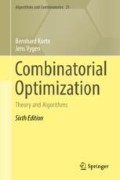Abstract
In this chapter we review the most important facts about Linear Programming. Although this chapter is self-contained, it cannot be considered to be a comprehensive treatment of the field. The reader unfamiliar with Linear Programming is referred to the textbooks mentioned at the end of this chapter.
Access this chapter
Tax calculation will be finalised at checkout
Purchases are for personal use only
References
General Literature
Bertsimas , D., and Tsitsiklis , J.N. [1997]: Introduction to Linear Optimization. Athena Scientific, Belmont 1997
Chvátal , V. [1983]: Linear Programming. Freeman, New York 1983
Matoušek , J., and Gärtner , B. [2007]: Understanding and Using Linear Programming. Springer, Berlin 2007
Padberg , M. [1999]: Linear Optimization and Extensions. Second Edition. Springer, Berlin 1999
Schrijver , A. [1986]: Theory of Linear and Integer Programming. Wiley, Chichester 1986
Cited References
Avis , D., and Chvátal , V. [1978]: Notes on Bland ’s pivoting rule. Mathematical Programming Study 8 (1978), 24–34
Bland , R.G. [1977]: New finite pivoting rules for the simplex method. Mathematics of Operations Research 2 (1977), 103–107
Borgwardt , K.-H. [1982]: The average number of pivot steps required by the simplex method is polynomial. Zeitschrift für Operations Research 26 (1982), 157–177
Carathéodory , C. [1911]: Über den Variabilitätsbereich der Fourierschen Konstanten von positiven harmonischen Funktionen. Rendiconto del Circolo Matematico di Palermo 32 (1911), 193–217
Dantzig , G.B. [1951]: Maximization of a linear function of variables subject to linear inequalities. In: Activity Analysis of Production and Allocation (T.C. Koopmans , ed.), Wiley, New York 1951, pp. 359–373
Dantzig , G.B., Orden , A., and Wolfe , P. [1955]: The generalized simplex method for minimizing a linear form under linear inequality restraints. Pacific Journal of Mathematics 5 (1955), 183–195
Farkas , G. [1894]: A Fourier -féle mechanikai elv alkalmazásai. Mathematikai és Természettudományi Értesitö 12 (1894), 457–472
Gale , D., Kuhn , H.W., and Tucker , A.W. [1951]: Linear programming and the theory of games. In: Activity Analysis of Production and Allocation (T.C. Koopmans , ed.), Wiley, New York 1951, pp. 317–329
Hoffman , A.J., and Kruskal , J.B. [1956]: Integral boundary points of convex polyhedra. In: Linear Inequalities and Related Systems; Annals of Mathematical Study 38 (H.W. Kuhn , A.W. Tucker , eds.), Princeton University Press, Princeton 1956, pp. 223–246
Kelner , J.A., and Spielman , D.A. [2006]: A randomized polynomial-time simplex algorithm for linear programming. Proceedings of the 38th Annual ACM Symposium on Theory of Computing (2006), 51–60
Klee , V., and Minty , G.J. [1972]: How good is the simplex algorithm? In: Inequalities III (O. Shisha , ed.), Academic Press, New York 1972, pp. 159–175
Kuhn , H.W. [1956]: Solvability and consistency for linear equations and inequalities. The American Mathematical Monthly 63 (1956), 217–232
Minkowski , H. [1896]: Geometrie der Zahlen. Teubner, Leipzig 1896
Motzkin , T.S. [1936]: Beiträge zur Theorie der linearen Ungleichungen (Dissertation). Azriel, Jerusalem 1936
von Neumann , J. [1947]: Discussion of a maximum problem. Working paper. Published in: John von Neumann, Collected Works; Vol. VI (A.H. Taub , ed.), Pergamon Press, Oxford 1963, pp. 27–28
Spielman , D.A., and Teng , S.-H. [2004]: Smoothed analysis of algorithms: why the simplex algorithm usually takes polynomial time. Journal of the ACM 51 (2004), 385–463
Steinitz , E. [1916]: Bedingt konvergente Reihen und konvexe Systeme. Journal für die reine und angewandte Mathematik 146 (1916), 1–52
Weyl , H. [1935]: Elementare Theorie der konvexen Polyeder. Commentarii Mathematici Helvetici 7 (1935), 290–306
Author information
Authors and Affiliations
Rights and permissions
Copyright information
© 2018 Springer-Verlag GmbH Germany
About this chapter
Cite this chapter
Korte, B., Vygen, J. (2018). Linear Programming. In: Combinatorial Optimization. Algorithms and Combinatorics, vol 21. Springer, Berlin, Heidelberg. https://doi.org/10.1007/978-3-662-56039-6_3
Download citation
DOI: https://doi.org/10.1007/978-3-662-56039-6_3
Published:
Publisher Name: Springer, Berlin, Heidelberg
Print ISBN: 978-3-662-56038-9
Online ISBN: 978-3-662-56039-6
eBook Packages: Mathematics and StatisticsMathematics and Statistics (R0)

